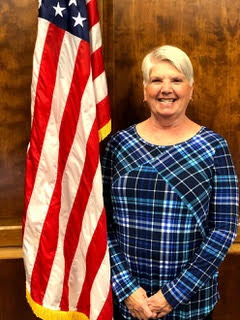
BY DEBBIE PAGE
debbiepage.iredellfreenews@gmail.com
Troutman Town Council member Sally Williams is seeking her third term in office during a period of rapid growth and change in Troutman.

Williams, who is one of five candidates running for a council seat in the November 2 election, graduated from Mitchell Community College with an associate’s degree. Several years later, she continued her education, graduating from Winston-Salem State University with a bachelor’s degree in applied science.
After finishing college, Williams taught physical education at Troutman Elementary School from 1976 until July 2010. She started in the system as a school bus driver and teacher assistant, earning her teaching credentials part time while working full time. She also coached soccer, volleyball, and basketball for Troutman Middle School.
POWERING THE ECONOMY
Williams touted the economic progress that has occurred during her tenure, in spite of COVID-19 restrictions and inevitable economic obstacles. “In the past few months, several new businesses have come to the empty downtown stores. These businesses are definitely different from our existing businesses,” she said.
“The town purchased a building several years back with the intention of updating it. In return we hope other owners would improve their buildings. With the additions of the new businesses, only two to three stores are now vacant in the downtown area.”
Williams noted that Troutman is currently a member of Iredell County Economic Development Corporation, which works with Mooresville, Statesville and Troutman and potential developers to bring new growth and jobs to Iredell County.
“With parcels of land available, our proximity to major highways makes it attractive to developers. Commercial development helps the citizens by not requiring as much resources from the town services and keeping property taxes down for the homeowner.”
Williams noted the council recently funded a new website with expanded information for citizens and potential business prospects. “Once it is completed, visitors to the webpage will be able to see our ‘brand’ and what the town can offer them,” she said.
To support existing businesses and attract more small Main Street business and service offerings that are now lacking in the community, Williams suggested forming a committee of interested volunteers to develop ideas to attract new Main Street businesses that are not currently offered.
She also favors reorganizing the recently disbanded Troutman Business Council with town business owners, perhaps through combining with those interested and the Troutman Business Network.
CONTINUING GROWTH CHALLENGES
Most Troutman residents would list traffic congestion as their number one concern. The population doubles during the school in session days, and Williams noted that the county is slated to build another high school in town limits.
Most of Troutman’s main roads and streets do not belong to the town, so the council cannot make any street improvements to them. “The North Carolina Department of Transportation is responsible, and we as council and town staff regularly communicate the need for improvements to them.”
Williams added: “I represent Troutman on the Lake Norman Transportation Committee (LNTC). At the August meeting Michael Poe, from NCDOT Division 12 Project Development, gave an update of projects and said Highway 21 from Cedar Lane to Barium lane is on hold until 2029.”
“I’m definitely not opposed to NCDOT’s idea of Highway 21 and Eastway Drive becoming one-way streets but not a roundabout downtown.”
Touting the council’s local street improvement plan implementation, Williams said, “Troutman town streets are in better shape now. However, we are still recommending new ideas and improvements with each development and each commercial project that comes to town.”
Though citizens have made some recommendations regarding the traffic, especially semi-trucks, “realistically these ideas can’t be enforced by Troutman Police.”
“The police department isn’t equipped nor trained to handle the issues with the semi-trucks. That would be left to the North Carolina Division of Motor Vehicles.”
However, the town is working with a company that provides GPS coordinates to reroute the semi-trucks from traveling through the downtown area.
The council has recently purchased several properties and lots with an eye toward alleviating Town Hall crowding and building a new Town Hall. “For a temporary fix, there are plans to move departments into some of the properties” next to Town Hall.
“Discussions have been held to build a new town hall. Money has been earmarked for capital outlay to help with the cost of building and possibly a low-interest loan,” she said. “We will look for grants as the time to build approaches.”
To maintain the charm and small-town feel of Troutman, the council has supported more commercial development in the I-77, Exit 42 area. “The project across from the charter school will be mixed use, meaning it is a combination of residential and commercial,” she said.
“The area around exit 42 has been zoned highway business to invite businesses there. Council would like commercial growth there to keep downtown more quaint.”
With the rapidly growing population comes more strains on infrastructure, including water and sewer. Williams said “the town can buy extra capacity for sewer. As a matter of fact, money was budgeted for extra capacity this fiscal year.”
“If Troutman owned its own water and sewer treatment facilities, the cost of hiring more personnel, purchasing the land, and building the plants along with breakdowns would likely raise taxes to cover these expenses,” she said.
She noted that towns and cities a lot larger than Troutman do not have their own treatment plants. “I’ve researched a city with the population of 18,000, and their water is provided by the county.”
“One of our issues is the county continues to build schools and other facilities that use lots of water and produce waste water, which is a burden to the town. Neither Mooresville or Statesville has that total expense.”
Williams believes the town has to have more support from them to maintain the water and sewer system without it being a tax burden on local citizens.
To promote the safety of children and growing school populations, Williams is proud the council approved one or two school resource officers for all of the Iredell-Statesville Schools inside the town’s city limits.
ENGAGING WITH COMMUNITY
“I have always said that I have an open door policy,” said Williams. “My telephone number is on my cards located in the lobby of Town Hall.”
Williams would “like to see council hold community or town hall meetings for the citizens to come and ask questions. Though some areas cannot be discussed by law, all Town Council meetings are public so anyone can attend.”
During COVID-19 restrictions, council meetings have also been live streamed for the public, and citizens can ask questions or make questions online during that time.
Williams looks forward to a return to normalcy and the resumption of entertaining events for which Troutman is known. “After the number of Covid cases go down, the town will start scheduling events again,” she said.
After some citizen complaints about the September cancellation of the Halloween Trails and Treats and the Wicked Fast 5K now that numbers have fallen in October, Williams explained that folks do not realize that scheduling and planning for a town event starts months before the actual date.
Williams hopes that “people would feel comfortable to come and ask me any questions. I get out in the community and talk with citizens and invite them to council meetings.”
Williams plans to attend more youth games to interact with youth and parents and to create a social media page to communicate with the citizens to further improve her accessibility.
Williams favors keeping the current at-large voting systems.
“Town citizens in the non-contiguous area are still represented by all council.” In the last several elections, Williams said most of the people who chose to run for council were within the contiguous areas of the town limits.
She encourages all citizens to get involved with their local government by serving on different committees and boards always looking for people to guide the town’s future.
FUTURE GOALS
Williams hopes council can more forward with the Lytton Street extension so that the first block of Wagner Street can be turned into an outdoor gathering plaza for the community, as shown in the Strategic Master Plan.
She points to the planters and solar powered lights recently added along the Wagner Street area to begin that beautification and curb appeal. Williams hopes that with applying for available grants and being frugal with the budget, the council can bring this and more of the SMP to fruition in the coming four years.
“I want to see projects that were discussed years ago finished and more greenways, bike, and pedestrian areas. I want to see more walkability for the citizens.”
FINAL PITCH
Williams believes her eight years of experience are an important asset to her candidacy. “It takes a good two years before you start to understand how government works and what is involved in government,” she said.
“Being on council is more than attending two meetings a month. I am meeting with citizens, developers, attending a monthly committee meeting representing Troutman, attending emergency called meetings, and doing research to prepare for the monthly meetings.”
Williams also expressed her compassion for the citizens and the town. “I feel like I have an easy-going personality and can work with fellow council members.”
As a lifelong resident of Troutman, Williams has seen many changes. The town has gone from having a railroad track going through the middle of town, no interstate, and no Lake Norman boom to an extensive greenway system replacing the railroad, new businesses and restaurants, and multiple accesses to a major interstate with rapid growth encroaching from Charlotte.
“I take careful considerations before I vote to allow developments. I weigh the impact it will have on the citizens and the town. I cannot ethically think of me, what I want or don’t want, but what is best for the taxpaying citizens.”



